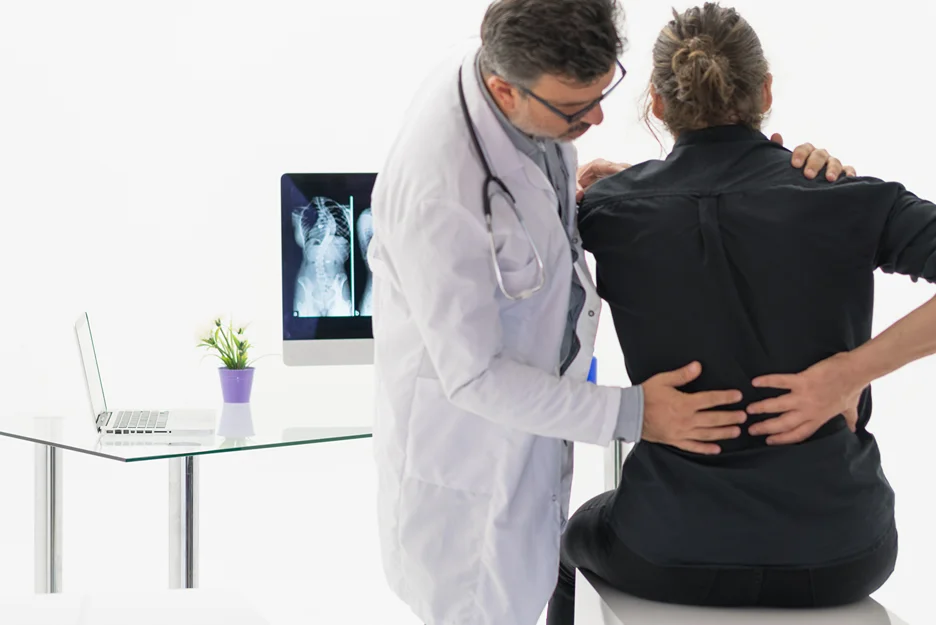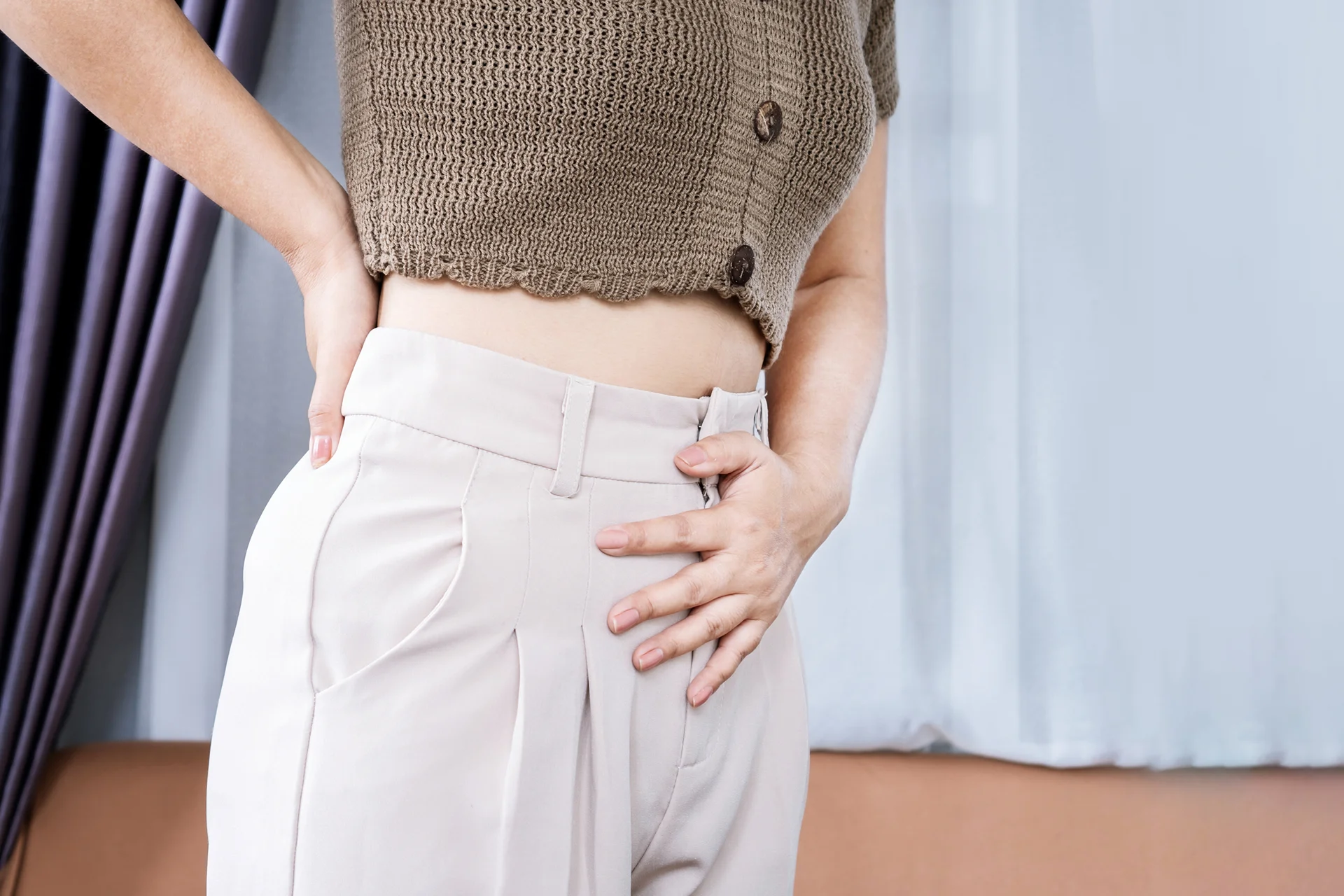Battling pain with every strain while passing stool? Your lack of healthy bowel movements may be the real culprit.
Most of us know the discomfort and bloating that comes from irregular or infrequent bowel movements. Do we really have to double the struggle by dealing with back pain, too?
Knowing there’s a link between constipation and back pain, you shouldn’t delay addressing it any further.
This guide will cover all the science-backed intel on what causes poo problems, how struggling to go can strain your back, and most importantly—proven treatments to get rid of constipation and your back calm again.
What is Constipation and Its Causes?
Before we explore how constipation causes back pain, let’s quickly cover what constipation is in the first place.
Doctors diagnose constipation when you experience infrequent bowel movements—less than three times a week—or difficult passage of stools. This results in dry stools that are often hard and lump-like.
Some of the most common causes of constipation include:
| Cause | Explanation |
| Not Enough Fiber | Diets lacking high-fiber foods don’t provide the 25-30 grams of daily fiber adults need. Fiber bulks up stool and draws water into the colon to keep BMs soft. |
| Dehydration | Inadequate fluid intake leads to the colon pulling water from stool, resulting in hard, dry BMs that are difficult to pass. |
| Medications | Iron supplements, blood pressure meds, pain meds, antidepressants, and antacids with calcium/aluminum can cause constipation. |
| Diseases & Disorders | Diabetes, thyroid issues, neurological conditions, bowel obstructions, multiple sclerosis, Parkinson’s disease, spinal cord injury, etc. |
| Lack of Activity | Weakened intestinal muscles from inactivity slow down transit time. |
| Ignoring Urges | Delaying bowel movements can lead to harder stools and increased difficulty in passing them |
| Stress & Anxiety | The brain-gut connection means stress can restrict the colon and impair motility. |
| Pregnancy | Hormone shifts and uterus pressure commonly cause poop issues. |
| Aging | Intestinal muscles weaken over time, slowing motility. |
Of course, everyone gets a bit backed up now and then. But if you experience chronic constipation for weeks or months, it can start to cause complications like hemorrhoids, anal fissures, and yes…back pain!
How Poop Problems Can Cause Achy Breaky Backs
There are a few main ways constipation can contort your spine and cause back pain:
Direct Nerve Irritation
Your lower back houses the network of nerves that control bowel movements and sensations. When stool excessively builds up, it places physical pressure on the nerves in the area, particularly the sacral nerves in the lower back.
This triggers irritation and pain signals that radiate into the lower back. It’s no coincidence most back pain from constipation concentrates in the lumbar region.
Tense Muscles
Chronic straining to pass hard stools overworks the abdominal and back muscles. They get fatigued, tense up, and sometimes go into spasm. This causes muscular back pain.
These muscle strains can also pinch nearby nerves, causing additional discomfort.
Poor Posture
Twisting and contorting your body trying to poo forces you into awkward postures that overload the spine. Slouching on the toilet for prolonged periods puts uneven pressure on back discs and joints too.
Exacerbating Existing Back Problems
If you already have spinal conditions like herniated discs, arthritis, or prior back injuries, the added strain of constipation can amplify these problems and cause flare-ups. Constipation is unlikely to be the sole cause, though.
Fecal Impaction and Intestinal Blockage
Extreme constipation can form an immobile mass of fecal matter that partially or fully blocks the intestines. This causes mainly intense abdominal pain that often radiates into the back. It’s a medical emergency requiring immediate treatment.
Irritable Bowel Syndrome
Though the connection is relatively weak and still needs further research, IBS can also be a possible cause of constipation and related back pain through intestinal referred pain, gas pressure, colon spasms, and increased pain sensitivity.
What Does Constipation Back Pain Feel Like?
Where and how severely you feel back pain from irregular BMs varies between individuals based on factors like posture, spinal health, pain tolerance, and location of nerve irritation. But here are some hallmarks:
- Lower back pain is a common symptom, occurring on one side or both.
- Usually feels like an ache, tightness, or pressure in the lumbar region.
- May come and go with bowel movements, easing after you finally go.
- Can become severe and chronic over time, lasting for weeks or months.
- May extend into the legs or buttocks if sciatic nerves are involved.
- Felt as a continuous dull ache during bowel straining.
- Pain ranges from mild to debilitating based on the underlying cause.
Keep in mind that everyone has a different pain experience. The location and intensity of back pain can vary greatly. Mild nerve irritation may cause brief twinges for one person and agonizing spasms for another.
Listen to your body. Severe or worsening pain needs prompt medical attention.
How Doctors Diagnose Back Pain from Poo Problems

If you suspect constipation is causing your sore back, your doctor can perform an exam and order tests to confirm. Here’s how they diagnose it:
| Diagnostic Test | Purpose |
| Physical Exam | Check for signs of nerve pinching, muscular tenderness, limited flexibility, and pain when moving in certain ways. Other causes also need to be ruled out. |
| Medical History | Ask about typical bowel habits, diet, fluid intake, medications, and supplements taken. |
| Rectal Exam | Check for impacted stool and observe posture on the toilet. |
| Blood Tests | Evaluate for nutritional deficiencies or illnesses affecting digestion. |
| Imaging | Order X-rays or CT scans to visualize stool buildup and check for obstructions or anatomical issues, especially if there are already tell-tale signs. |
| Colonoscopy | Insert a tube with a camera into the colon to inspect its health if obstruction and colon cancer are suspected. |
| Bowel Habit Tracking | Have the patient track stool consistency, straining, pain, etc. in a diary for 2 weeks. |
Once any underlying health conditions are treated and constipation is confirmed as the pain trigger, the doctor creates a treatment plan tailored to your situation.
Finding Back Pain Relief Through Regular Defecation
The key to relieving constipation-caused back pain lies in tackling the root issue: irregular bowel movements. Your doctor may recommend:
Diet Changes – Eating more high-fiber foods and staying hydrated softens stool for easier passing.
Exercise – Regular physical activity can help promote bowel movements and maintain healthy bowel function
OTC Laxatives – Stool softeners, fiber supplements, osmotic agents, and stimulant laxatives help with short-term relief. Use as directed.
Prescription Laxatives – For stubborn cases, medications like Linzess and Amitiza relieve chronic constipation.
Other Medications – Stool softeners, prokinetics to improve motility, nerve pain relievers, and antidepressants that relax muscles. They may be prescribed depending on the specific cause of constipation and back pain.
Bowel Retraining – Re-establishing regular bathroom habits by preemptively sitting on the toilet at the same time daily.
Enemas & Irrigation – Flush out clumped feces using enemas, water irrigation devices, or manual disimpaction.
Once constipation improves, the back pressure and strain should subside, gradually easing pain.
Specific treatments like physical therapy, chiropractic adjustments, massage, warm compresses, and OTC pain medication can provide additional relief as things get moving again.
Other Ways to Prevent Pain By Encouraging Regular BMs
You can avoid the achy misery of constipation and back pain by staying regular through diet, exercise, fluid intake, and long-term defecation re-training. Follow these pro tips:
- Eat 25-30 grams of fiber daily with fruits, veggies, beans, and whole grains.
- Stay hydrated with 64+ ounces of water, herbal tea, and other fluids.
- Never ignore or delay the urge to poo to avoid stool buildup.
- Establish a routine of sitting on the toilet.
- Listen to your body and respond to the urge to have a bowel movement when it arises
- Limit constipating foods like cheese, meat, eggs, and processed choices.
- Ask your doctor before starting any potentially constipating medications.
- Use OTC laxatives sparingly and only when needed, not daily.
- Address any chronic health issues contributing to constipation.
- Manage stress through relaxation practices like yoga, deep breathing, and meditation.
Get Your Bowels and Back Feeling Better
If you currently find yourself all clogged up and aching, don’t waste time waiting for it to pass (no pun intended). Be proactive and talk to your doctor to get the poo process moving ASAP.
In the meantime, try these simple constipation remedies at home for a little relief until bowel regularity is reestablished:
- Apply heating pads or warm compresses to tense back muscles to encourage relaxation. Make sure your specific condition allows this before trying.
- Massage painful lower back areas to increase blood flow and loosen tight tissues. Check with your doctor first, though.
- Perform gentle yoga stretches that elongate the spine, like child’s pose and cat-cow pose.
- Improve posture by sitting up straight, limiting time on the toilet, and avoiding slouching.
- Take over-the-counter pain relievers like Tylenol to ease spinal discomfort temporarily. Use as directed.
- Consider using a squatty potty to pass stool in a more natural position that minimizes straining.
- Increase mobility and stimulate the colon with light walking, swimming, or another gentle activity.
Your back will thank you later! Of course, always check with your doctor before starting any new supplements, exercises, or self-care practices when in pain.
Match With the Right Expert Now

Searching for a compassionate and competent medical expert to help you with this problem? The gastrointestinal specialists at Kaly have got your back (and bowel)!
Kaly makes it easy to find experienced gastroenterologists, colorectal surgeons, and other experts in your area. Just enter your zip code to browse doctor profiles, read real patient reviews, and book appointments online.
Whether you’re suffering from temporary constipation back pain or an ongoing number 2 issue like IBS or Crohn’s, the knowledgeable doctors at Kaly can help devise a treatment plan to get your digestion and spine back in sync.
Stop suffering and letting poo and pain problems negatively impact your life. Browse for local specialists post haste!
